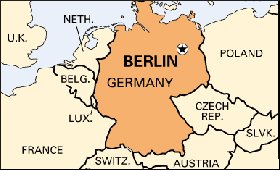|

|
Domestic demand boosts German growth at 2015 year-end
|
|

|
|
| Top Stories |
 |
|
|
|
IANS | 12 Feb, 2016
Boosted by domestic demand, the
German economy expanded by 0.3 percent in the final quarter of 2015,
official data showed on Friday.
The growth pace was the same as in the third quarter and in line with economists' expectation, Xinhua reported.
"The
economic situation in Germany in 2015 was characterised by solid and
steady growth," said German federal statistics office Destatis. In both
first and second quarters of last year, Europe's biggest economy
expanded by 0.4 percent.
Destatis attributed the growth at the
year-end mainly to domestic demand. Government spending increased
markedly during the last three months, private consumption rose
slightly, investment in construction sector also made a notable
contribution, it said.
Net exports, Germany's traditional driving engine, however, weighed on the growth as both exports and imports declined.
The
statistics office confirmed its preliminary calculations that the
German gross domestic product (GDP) increased by 1.7 percent over the
whole year of 2015.
"Without any doubt, the performance of the
German economy since 2009 has been impressive. In 27 quarters, the
economy only shrank three times," said ING-DiBa bank's chief economist
Carsten Brzeski.
However, he warned that the German economy would
encounter stronger headwinds this year mainly due to global growth
weakness but also to refugee crisis and increasing political
uncertainty.
"Looking ahead, the year 2016 could be more challenging for the German economy than many had expected," Brzeski said in a note.
Thanks
to stable labour market, increasing wages, low interest rates and
falling energy prices, German consumers' willingness to loosen their
purses stood at a high level.
The influx of refugees, nearly 1.1
million in 2015 and a similar number in 2016, also stimulated government
spending on accommodating and integrating the newcomers.
Economists
and business groups, however, were concerned about a lack of investment
inside the country and uncertainties around factors which currently
seemed positive for exports such as a weak euro and low oil prices.
In last month, the German government cut its forecast for economic growth in current year to 1.7 percent from 1.8 percent.
It
pledged to strengthen public investment, support the digitalisation in
the industry and take measures to stimulate private investment in a bid
to ensure that "Germany will also be a global leading economic and
industrial location in ten years."
|
|
|
| |
|
|
|
|
|
|
|
|
|
|
|
|
|
|
| |
| Customs Exchange Rates |
| Currency |
Import |
Export |
US Dollar
|
66.20
|
64.50 |
UK Pound
|
87.50
|
84.65 |
Euro
|
78.25
|
75.65 |
| Japanese
Yen |
58.85 |
56.85 |
| As on 13 Aug, 2022 |
|
|
| Daily Poll |
 |
 |
| PM Modi's recent US visit to redefine India-US bilateral relations |
|
|
|
|
|
| Commented Stories |
 |
|
|
|
|
|
| |
|